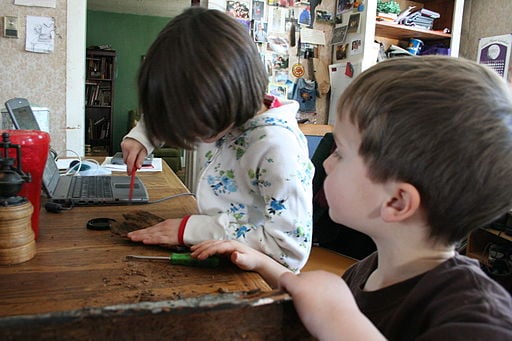 Don’t bother texting me because I use my cell phone to, you know, make calls. Despite my recent entry to Facebook and blogging, I’m a bit of a Luddite. So you won’t be surprised that I have not bought a million educational apps to use for homeschooling. Until this week, I hadn’t bought any.
Don’t bother texting me because I use my cell phone to, you know, make calls. Despite my recent entry to Facebook and blogging, I’m a bit of a Luddite. So you won’t be surprised that I have not bought a million educational apps to use for homeschooling. Until this week, I hadn’t bought any.
My general philosophy regarding educational apps has been this: Sure, they are more attractive to kids than paper and pencil tasks, but that doesn’t mean they learn more from them. And the downside of having kids spend so much time glued to a screen outweighs their benefits. Most of the time, a good teacher, with the right mix of creativity, passion and expertise trumps the best technology.
And yet, here I am telling you to buy this app, which teaches kids as young as five how to solve algebraic equations. They don’t have to know basic arithmetic to play the game successfully, and they have no idea they are learning algebra because the game is so engaging. I’m a pretty good math teacher, and this app is far and away better than anything I could put together myself. It’s called DragonBox, and in Norway, where the game was invented, it’s more popular than Angry Birds.
Don’t believe me that it could be as great as all that? After discovering the game, I went online to see if others thought it was as fabulous as I did. Jonathon Liu wrote last year in Wired:
DragonBox is making me reconsider all the times I’ve called an educational app “innovative.” Many educational apps are some form of flashcard, a way to enforce rote repetition and memory with some veneer of interactivity and multimedia layered on top. To be honest, I’m pretty tired of interactive picture books — yes, there are definitely some fun ones out there, but they’re not really any more “innovative” than pop-up books read out loud by an adult. It’s just an extension of the medium.
Here, though, we have an app that is allowing kids to learn a tricky subject through a gradual introduction of new rules and concepts — just like playing through an in-game tutorial where you first learn to look around, then walk, then jump, then pull out your weapons and fire, and then you’re off and running and you never had to sit down and read a manual. When the developers tested their app with hundreds of students in Norway, they found that more than 30% of them were able to solve equations after an hour of playing the game, and that rate more than doubled after two hours.
Even if you’re not convinced, give it a try. You may quit saying things like, “I’m just not good at math.” Even if you love math, you and your kids will have a blast playing it. When you’re done, let me know what you think. And be sure to share your favorite educational apps. I just might become a technophile after all.











